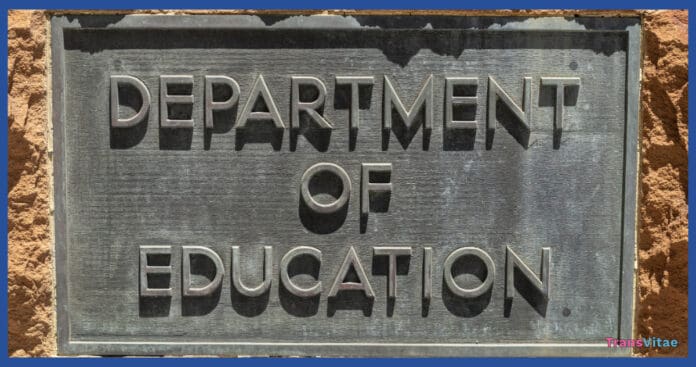In another controversial move, the U.S. Department of Education has launched Title IX investigations into the California Interscholastic Federation (CIF) and the Minnesota State High School League (MSHSL) for allegedly violating federal antidiscrimination laws by allowing transgender athletes to participate in girls’ and women’s sports. According to the Department of Education, both organizations have “publicly announced plans” to defy the federal government’s directive, setting the stage for a legal battle that could have far-reaching consequences for transgender students and the future of school athletics.
The investigation comes on the heels of President Donald Trump’s executive order “Keeping Men Out of Women’s Sports,” which reverses Title IX guidance established under the Biden administration. Under the new directive, Title IX—originally designed to prevent sex-based discrimination—is being reinterpreted to prohibit transgender girls and women from competing in female sports categories. Schools and state athletic organizations that fail to comply risk losing federal funding and could face legal action.
California’s Stand: Compliance with State Law Over Federal Mandates
In California, the CIF has long been a champion of inclusion and fairness. The organization’s policy permits students to participate in school programs and athletic teams consistent with their gender identity, irrespective of the gender listed on their school records. This policy aligns with California state law, which offers clear protections for transgender students.
“Students in California are allowed to participate consistent with their gender identity,” CIF said in a statement, emphasizing that it remains in compliance with California Education Code Section 221.5. While acknowledging the federal investigation, CIF declined to comment on pending cases, stating only that it does not collect data on transgender athletes and will continue to follow state law.
Equality California executive director Tony Hoang expressed strong support for CIF’s stance, calling the investigation “another politically motivated attack” on transgender youth. “This policy aligns with California law and fundamental principles of fairness and inclusion,” Hoang said. “These protections have existed for years without issue and have allowed transgender athletes in California to play alongside their teammates — just like everyone else.”
However, conservative groups such as the California Family Council view the situation differently. In a statement, the organization praised the federal investigation, accusing CIF of prioritizing “radical gender ideology over fairness, safety, and the integrity of women’s athletics.”
Minnesota’s Defiance: Upholding State Human Rights Law
In Minnesota, the situation is equally contentious. The MSHSL has refused to comply with the executive order, citing the Minnesota Human Rights Act and the state constitution as the basis for its policies. The Human Rights Act prohibits discrimination based on gender identity, allowing transgender students to participate in school sports consistent with their gender identity.
In response to the investigation, the MSHSL issued a statement reaffirming its commitment to inclusion and compliance with state law: “League member schools have done excellent work in respecting students and their individual situations as they determine participation and eligibility within interscholastic sports.”
Minnesota House Republicans quickly criticized the MSHSL’s defiance, urging it to reconsider its stance and comply with the federal mandate. “This executive order intends to uphold fairness and maintain competitive integrity in school-based athletics,” wrote House Speaker Rep. Lisa Demuth. “By refusing to comply, we believe the MSHSL is jeopardizing equal opportunities for all athletes, particularly female athletes.”
Despite the political pressure, MSHSL appears resolute in its position, with legal counsel reviewing the Department of Education’s communication and promising to cooperate fully with the investigation.
A Legal and Cultural Collision
The investigations into CIF and MSHSL highlight a growing collision between state laws that protect transgender rights and federal directives that seek to restrict them. Both California and Minnesota have made clear their intention to prioritize state law, placing them at odds with the Department of Education’s interpretation of Title IX.
Craig Trainor, acting assistant secretary for civil rights at the Department of Education, reiterated the department’s position, stating, “State laws do not override federal antidiscrimination laws, and these entities and their member schools remain subject to Title IX and its implementing regulations.”
The stakes are high. If the Department of Education determines that CIF and MSHSL are in violation of federal law, it could result in the loss of critical funding for schools in both states—a significant blow to education systems already under strain.
The Human Impact
While much of the public debate focuses on policy and legal battles, it is essential not to lose sight of the human impact. For transgender students in California and Minnesota, these investigations are more than political; they represent a direct attack on their right to exist and participate fully in school life.
Known cases of transgender athletes competing in high school sports are minimal, but the backlash they face is outsized and dangerous. Two transgender girls at Martin Luther King High School in Riverside, California, have received threats and scrutiny for competing in track and field. In Minnesota, transgender athlete Kaija Bjorkstrand, who competes in bowling, has seen her very existence turned into a political debate.
Kaija summed it up perfectly: “The transgender sports issue is the most important, least important thing going on right now.”
The Bottom Line
As the investigations unfold, the future of transgender participation in school sports hangs in the balance. The Department of Education’s aggressive enforcement of Title IX under the Trump administration signals a new era of federal oversight that could have lasting consequences for schools and students across the country.
For CIF and MSHSL, the challenge is clear: continue to protect the rights of transgender students under state law or risk federal punishment for standing by their principles. The stakes could not be higher, and the coming months will likely see this issue move from the field of play into the courtroom.
For transgender youth, their families, and allies, now is the time to remain vigilant and continue advocating for fairness, dignity, and inclusion. This fight is far from over, but one thing is certain: the voices of those affected will not be silenced.


